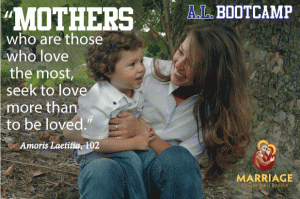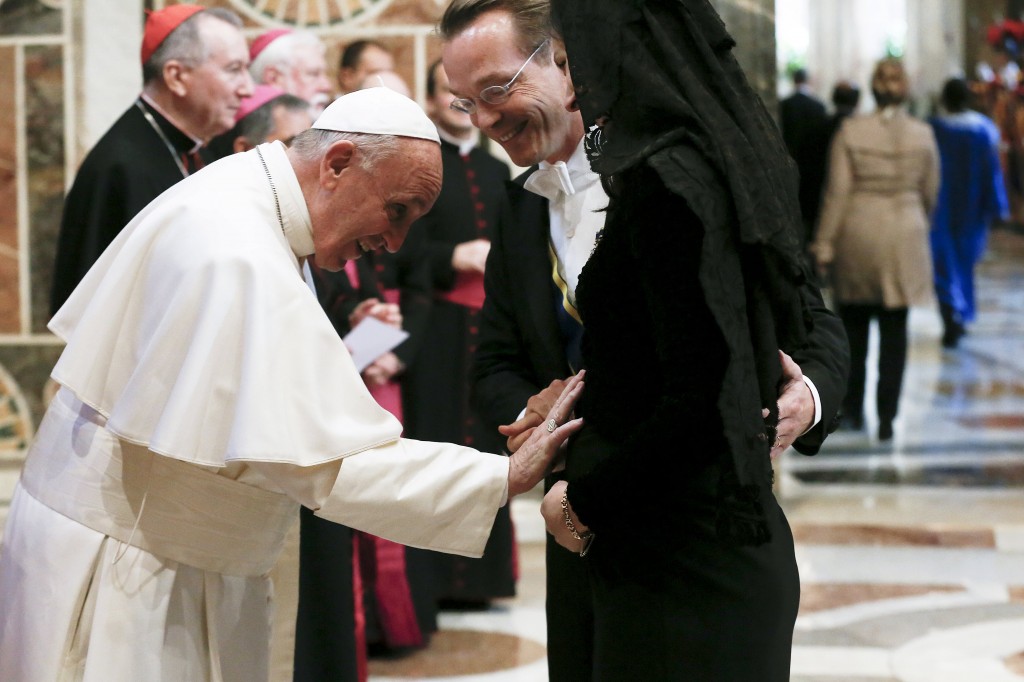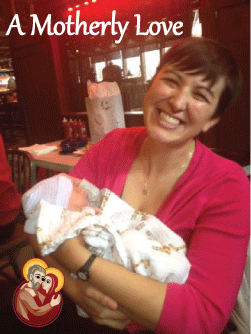Amoris Laetitia: Mothers and Fathers
 Theresa Farnan, Ph.D. is currently an adjunct member of the philosophy department at Franciscan University of Steubenville and a consultant to the USCCB Committee on Laity, Marriage, Family Life and Youth. Find more of her work on her website.
Theresa Farnan, Ph.D. is currently an adjunct member of the philosophy department at Franciscan University of Steubenville and a consultant to the USCCB Committee on Laity, Marriage, Family Life and Youth. Find more of her work on her website.
With the publication of Amoris Laetitia (AL), Pope Francis offers some timely thoughts on the importance of both mothers and fathers for families. He begins his meditation on “the joy of love experienced by families” (no. 1) by painting a vivid picture of family life. “At the center, we see the father and mother, a couple with their personal story of love. They embody the primordial divine plan clearly spoken of by Christ himself: ‘Have you not read that he who made them from the beginning made them male and female?’ (Mt 19:4)” (no. 9).
Francis reminds us that the “deepest reality” of human couples originates with sexual difference – “it is striking,” he notes, “that the ‘image of God’ here refers to the couple ‘male and female’” (no.10). The fruitful, life-giving love of a man and woman gives rise to the family, a “living reflection” of the “communion of love” that is the Trinity (no. 11).
Throughout Amoris Laetitia, Francis strongly reaffirms the importance of sexual difference as the foundation of marriage, lamenting the “failure to realize that only the exclusive and indissoluble union between a man and a woman has a plenary role to play in society as a stable commitment that bears fruit in new life” (no. 52).
In fact, Francis notes, every child deserves to be loved by both mother and father. “The love of parents is the means by which God our Father shows his own love,” not just individually, through each parent’s love for his or her children, but together, as a couple whose love for each other is the foundation of the family (no. 170). Husband and wife, father and mother, both “cooperate with the love of God the Creator, and are, in a certain sense, his interpreters.” Together “they show their children the maternal and paternal face of God” (no. 172).
Mothers and fathers have different relationships with their children. Pope Francis, in a beautiful tribute to mothers, praises their warmth and their tenderness, their dedication and moral strength, all of which help the child “develop a capacity for intimacy and empathy” (nos. 174-175). Fathers are equally important, mediating between the child and the world, helping the child “to perceive the limits of life, to be open to the challenges of the wider world and to see the need for hard work and strenuous efforts” (no. 175).
Francis laments individualism that sees motherhood as a threat to women’s freedom, and offers men a confused understanding of masculinity that devalues fatherhood, commitment, and responsibility (see nos. 173, 176). At the same time, he rejects a rigid division of roles and responsibilities, reminding us that it is the “clear and well-defined presence of both figures, male and female” that best allows children to flourish (no. 175).
In his discussion of the importance of the presence of mothers and fathers, we can see the unique stamp of Francis’s pastoral theology of accompaniment. The family – founded on the loving union of a man and woman – is the primary school in the art of accompaniment, where a child is loved and learns to love.
Archive
Being Motherly When You Don’t Have Children
I may seem unqualified to write a reflection on motherhood. After all, I’m not (technically) a mother; I don’t have any children. However, this apparent lack does give me a unique insight into the beautiful truth that all women are called to be motherly as a way of living out our unique dignity and vocation as women.
All of us, men and women, have the same fundamental vocation: to love (see St. John Paul II, Familiaris Consortio, no. 11). The way women live out our vocation to love is profoundly shaped by our capacity to welcome and give birth to new life. Recent popes have stressed that this capacity is not just biological but affects us down to the core of our identity as women. Being apt-for-motherhood is inseparable from who we are.
Pope Francis pointed to this truth in his apostolic exhortation Amoris Laetitia: “Motherhood is not a solely biological reality, but is expressed in diverse ways” (no. 178). St. Pope John Paul II gave us ample guidance on what these “diverse ways” of expressing motherhood are. At the heart of motherhood, he said, is “a special openness” to a new child, an “interior readiness” to accept him or her, and “a special communion with the mystery of life” (Mulieris Dignitatem, no. 18). While these characteristics are easy to see in the actual conception and birth of a child, this attitude of openness, welcome, and closeness to the mystery of life can be seen in myriad other ways of living out one’s motherhood, such as a concern for the needy and vulnerable, an attentiveness to other people, and generous service to others (see Mulieris Dignitatem, no. 21; and John Paul II, Letter to Women, nos. 9 and 12).
Put another way, conceiving and giving birth to a child, while praiseworthy in an era that often rejects the gift of life and fails to protect the child in the womb, is still only the threshold of motherhood in all its fullness. Motherhood finds its deepest meaning in a concerted effort to do God’s will, to receive another person fully and to generously seek his or her good. Jesus said, “My mother and my brethren are those who hear the word of God and do it” (Luke 8:21). This motherhood is not always the mother-and-child tableau that first comes to mind. Some of the more “hidden” forms could include a mother who places her beloved child with an adoptive family, seeking the child’s flourishing despite her own aching heart; a mother who says goodbye to several children before others even knew they existed, carrying them always in her heart despite her empty arms; a wife not granted the gift of new life but who pours herself out in the service of her extended family; a godmother who steps up as a motherly presence for her godchild when his parents’ lives get hectic; a woman who notices when a co-worker is struggling and offers to help; and so on. These and so many other ways are how all women can live out their motherhood! And they are ways women, even those not blessed with physical motherhood, can affirm the goodness of each and every person, the gift that each child is (truly a gift; not deserved), and how all are called to welcome life at all its stages.
Bethany Meola is an Assistant Director in the Secretariat for Laity, Marriage, Family Life, and Youth
Archive
Pope Francis on Mothers

Pope Francis greets an ambassador and his wife during an audience with the diplomatic corps at the Vatican Jan.11. (CNS photo/Alessandro Bianchi, Reuters) See POPE-DIPLOMATS Jan. 11, 2015.
Happy Mother’s Day from Pope Francis and Amoris Laetitia!
On tenderness:
“Let us consider the moving words of Psalm 131. As in other biblical texts (e.g., Ex 4:22; Is 49:15; Ps 27:10), the union between the Lord and his faithful ones is expressed in terms of parental love. Here we see a delicate and tender intimacy between mother and child: the image is that of a babe sleeping in his mother’s arms after being nursed. As the Hebrew word gamûl suggests, the infant is now fed and clings to his mother, who takes him to her bosom. There is a closeness that is conscious and not simply biological” (no. 28).
On pregnancy and expecting a child:
“Pregnancy is a difficult but wonderful time. A mother joins with God to bring forth the miracle of a new life. Motherhood is the fruit of a ‘particular creative potential of the female body, directed to the conception and birth of a new human being’. Each woman shares in ‘the mystery of creation, which is renewed with each birth’. The Psalmist says: ‘You knit me together in my mother’s womb’ (Ps 139:13). Every child growing within the mother’s womb is part of the eternal loving plan of God the Father: ‘Before I formed you in the womb I knew you, and before you were born I consecrated you’ (Jer 1:5)… A pregnant woman can participate in God’s plan by dreaming of her child. “For nine months every mother and father dreams about their child… You can’t have a family without dreams. Once a family loses the ability to dream, children do not grow, love does not grow, life shrivels up and dies’ (nos. 168-169).
“Expectant mothers need to ask God for the wisdom fully to know their children and to accept them as they are” (no. 170).
“With great affection I urge all future mothers: keep happy and let nothing rob you of the interior joy of motherhood. Your child deserves your happiness. Don’t let fears, worries, other people’s comments or problems lessen your joy at being God’s means of bringing a new life to the world. Prepare yourself for the birth of your child, but without obsessing, and join in Mary’s song of joy: ‘My soul proclaims the greatness of the Lord and my spirit exults in God my Savior, for he has looked with favor on the lowliness of his servant’ (Lk 1:46-48). Try to experience this serene excitement amid all your many concerns, and ask the Lord to preserve your joy, so that you can pass it on to your child” (no. 171).
On a child’s need for a mother:
“We cannot ignore the need that children have for a mother’s presence, especially in the first months of life. Indeed, ‘the woman stands before the man as a mother, the subject of the new human life that is conceived and develops in her, and from her is born into the world’. The weakening of this maternal presence with its feminine qualities poses a grave risk to our world. I certainly value feminism, but one that does not demand uniformity or negate motherhood. For the grandeur of women includes all the rights derived from their inalienable human dignity but also from their feminine genius, which is essential to society. Their specifically feminine abilities – motherhood in particular – also grant duties, because womanhood also entails a specific mission in this world, a mission that society needs to protect and preserve for the good of all” (no. 173).
“A mother who watches over her child with tenderness and compassion helps him or her to grow in confidence and to experience that the world is a good and welcoming place. This helps the child to grow in self-esteem and, in turn, to develop a capacity for intimacy and empathy” (no. 175).
On society’s need for mothers:
“‘Mothers are the strongest antidote to the spread of self-centered individualism… It is they who testify to the beauty of life’. Certainly, ‘a society without mothers would be dehumanized, for mothers are always, even in the worst of times, witnesses to tenderness, dedication and moral strength. Mothers often communicate the deepest meaning of religious practice in the first prayers and acts of devotion that their children learn… Without mothers, not only would there be no new faithful, but the faith itself would lose a good part of its simple and profound warmth… Dear mothers: thank you! Thank you for what you are in your family and for what you give to the Church and the world’. (no. 174).
For more from Pope Francis on motherhood, read his catechesis from January 7, 2015!
Archive
A Motherly Love: Single People and the Family
 Lori was my first friend to have a baby. I looked at this little person in her arms and thought about how blessed Therese was to have Lori and Tim as her parents. She had such a thoughtful expression, this baby girl. I was never one for babysitting, but I could come through in a pinch and struggle my way through reading baby signs that I was never taught (and no, this knowledge doesn’t come automatically with XX chromosomes!). Slowly, as more and more of my friends married and had children, rather than feeling myself more distant from them in my single state, I felt carried along, almost as if I was likewise becoming a mother, albeit not in the same way. I know allllllll sorts of things about pregnancy, childbirth, and raising children now, even though I haven’t gone through any of it myself. I feel towards my friends’ children a fierce protectiveness and a tender affection. I know their temperaments and have seen them on good days and bad days.
Lori was my first friend to have a baby. I looked at this little person in her arms and thought about how blessed Therese was to have Lori and Tim as her parents. She had such a thoughtful expression, this baby girl. I was never one for babysitting, but I could come through in a pinch and struggle my way through reading baby signs that I was never taught (and no, this knowledge doesn’t come automatically with XX chromosomes!). Slowly, as more and more of my friends married and had children, rather than feeling myself more distant from them in my single state, I felt carried along, almost as if I was likewise becoming a mother, albeit not in the same way. I know allllllll sorts of things about pregnancy, childbirth, and raising children now, even though I haven’t gone through any of it myself. I feel towards my friends’ children a fierce protectiveness and a tender affection. I know their temperaments and have seen them on good days and bad days.
I was reading a book by a fountain one day, and a young mother was there with her toddler. The little boy was running around making noise, trying to balance and jump. His mother said, “I’m sorry,” for disturbing me, and I said, “Oh no, it’s fine,” and then caught myself before I said what came spontaneously to mind, which was, “I have a bunch of kids too, I know what that’s like.” As she walked away, I thought about how naturally that came to me and how it explains my attitude toward all children. Once this gift of spiritual motherhood is perfected, I hope that one day I will resemble the woman in C.S. Lewis’s The Great Divorce:
And who are all these young men and women on each side?”
“They are her sons and daughters.”
“She must have had a very large family, Sir.”
“Every young man or boy that met her became her son – even if it was only the boy that brought the meat to her back door. Every girl that met her was her daughter.”
“Isn’t that a bit hard on their own parents?”
“No. There are those that steal other people’s children. But her motherhood was of a different kind. Those on whom it fell went back to their natural parents loving them more. Few men looked on her without becoming, in a certain fashion, her lovers. But it was the kind of love that made them not less true, but truer, to their own wives.”
Since I never have my own baby on my hip, I’m always there at a party or event to hold one so that mom or dad can eat. Since I don’t have to look around for any mischief my own toddler is getting into, I can give my full attention to someone else’s who wants to show me his latest Lego creation. I have grown so much and experienced such grace even in the midst of the suffering of being the only person in the room who is not married or does not have children, as long as God remains my focus.
One day, that same little Therese, years later, was talking with her mom about vocations. Lori told her about the calling to religious life and the gift of marriage. Then she said, “And some people serve God in a single life.” Therese responded, “Like Miss Sara?” “Yes, like Miss Sara.”
—————————————
Sara Perla is Program Specialist for the Subcommittee for the Promotion and Defense of Marriage